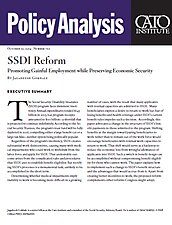Determining whether medical impairments imply inability to work is becoming more difficult in a growing number of cases, with the result that many applicants with residual capacities are admitted to SSDI. Many beneficiaries express a desire to return to work but fear of losing benefits and health coverage under SSDI’s current benefit rules impedes such a decision. Accordingly, this paper advocates a change in the structure of SSDI’s benefit payments to those admitted to the program. Shifting benefits at the margin toward paying beneficiaries to work rather than to remain out of the work force would encourage beneficiaries with residual work capacities to return to work. That shift would serve as a backstop to reduce the economic loss from wrongful allowances of applicants into SSDI. Such a switch in benefit design can be accomplished without compromising benefit eligibility for those who cannot work. The paper explains how to implement such a change to SSDI’s benefit structure and the advantages that would accrue from it. Apart from creating better incentives to work, the proposed reform complements other reforms Congress might adopt.
SSDI Reform: Promoting Gainful Employment while Preserving Economic Security
The Social Security Disability Insurance (SSDI) program faces imminent insolvency. Annual expenditures totaled $143 billion in 2013, but program receipts amounted to $111 billion—a shortfall that is projected to continue indefinitely. According to the Social Security Trustees, the program’s trust fund will be fully depleted in 2016, compelling either a large benefit cut or a large tax hike—neither option being politically popular. Regardless of the program’s insolvency, SSDI creates substantial work disincentives, causing many with medical impairments who could work to withdraw from the labor force and apply for SSDI. That undesirable outcome arises from the complicated rules and procedures that SSDI uses to establish benefit eligibility. But rectifying SSDI’s processes is a monumental task, unlikely to be accomplished in the short term.

